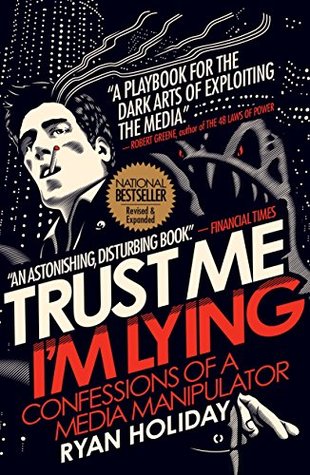More on this book
Community
Kindle Notes & Highlights
The economics of the internet created a twisted set of incentives that make traffic more important—and more profitable—than the truth.
Some people in the press, I think, are just lazy as hell. There are times when I pitch a story and they do it word for word. That’s just embarrassing. They’re adjusting to a time that demands less quality and more quantity. And it works to my advantage most of the time, because I think most reporters have liked me packaging things for them. Most people will opt for what’s easier, so they can move on to the next thing. Reporters are measured by how often their stuff gets on Drudge. It’s a bad way to be, but it’s reality.
If you get a blog on Wired.com to mention your start-up, you can smack “ ‘A revolutionary device’—Wired” on the box of your product just as surely as you could if Wired had put your CEO on the cover of the magazine.
The problem is that the truth—your response—is often much less interesting than the accusations.
The problem is that facts are rarely clearly good or bad. They just are. The truth is often boring and complicated. Navigating this quandary forces marketers and publishers to conspire to distort this information into something that will register on the emotional spectrum of the audience.
Things must be negative but not too negative. Hopelessness, despair—these drive us to do nothing. Pity, empathy—those drive us to do something, like get up from our computers to act. But anger, fear, excitement, laughter, and outrage—these drive us to spread. They drive us to do something that makes us feel as if we are doing something, when in reality we are only contributing to what is probably a superficial and utterly meaningless conversation.
“In an age of images and entertainment, in an age of instant emotional gratification, we neither seek nor want honesty or reality. Reality is complicated. Reality is boring. We are incapable or unwilling to handle its confusion.”
People don’t read one blog. They read a constant assortment of many blogs, and so there is little incentive to build trust.
Discoverability of new articles is another problem. Earlier RSS feeds allowed readers to subscribe to their favourite websites and passively get updates about new articles. With aggregator platforms like Reddit, HackerNews and Facebook, this is no longer the need and readers find it more convenient to let these aggregators decide the content and their updates for them.
Think about how we consume content online. It is not by subscription. The only viable subscription method for blogs, RSS, is long dead. Just look at the top referring sources of traffic to major websites and blogs. Cumulatively, these referring sources almost always account for more visitors than the site’s direct traffic (i.e., people who typed in the URL). Though it varies from site to site, the biggest sources of traffic are, usually, in varying order: Google, Facebook, Twitter. The viewers were sent directly to a specific article for a disposable purpose: They’re not subscribers; they are
...more
Think about it: Do you make a habit of checking back on Wikipedia pages just to make sure nothing has changed?
The reality is that while the internet allows content to be written iteratively, the audience does not read or consume it iteratively. Each member usually sees what he or she sees a single time—a snapshot of the process—and draws his or her conclusions from that.
Once the mind has accepted a plausible explanation for something, it becomes a framework for all the information that is perceived afterward. We’re drawn, subconsciously, to fit and contort all the subsequent knowledge we receive into our framework, whether it fits or not. Psychologists call this cognitive rigidity. The facts that built an original premise are gone, but the conclusion remains—the general feeling of our opinion floats over the collapsed foundation that established it.
To be called a douche or a bro or any such label is to be branded with all the characteristics of what society has decided to hate but can’t define. It’s a way to dismiss someone entirely without doing any of the work or providing any of the reasons.
It is now almost cliché for people to say, “If the news is important, it will find me.” This belief itself relies on abandoned shells. It depends on the assumption that the important news will break through the noise while the trivial will be lost. It could not be more wrong. As I discovered in my media manipulations, the information that finds us online—what spreads—is the worst kind. It raised itself above the din not through its value, importance, or accuracy but through the opposite, through slickness, titillation, and polarity.
Entertainment powered television, and so everything that television touched—from war to politics to art—would inevitably be turned into entertainment.


